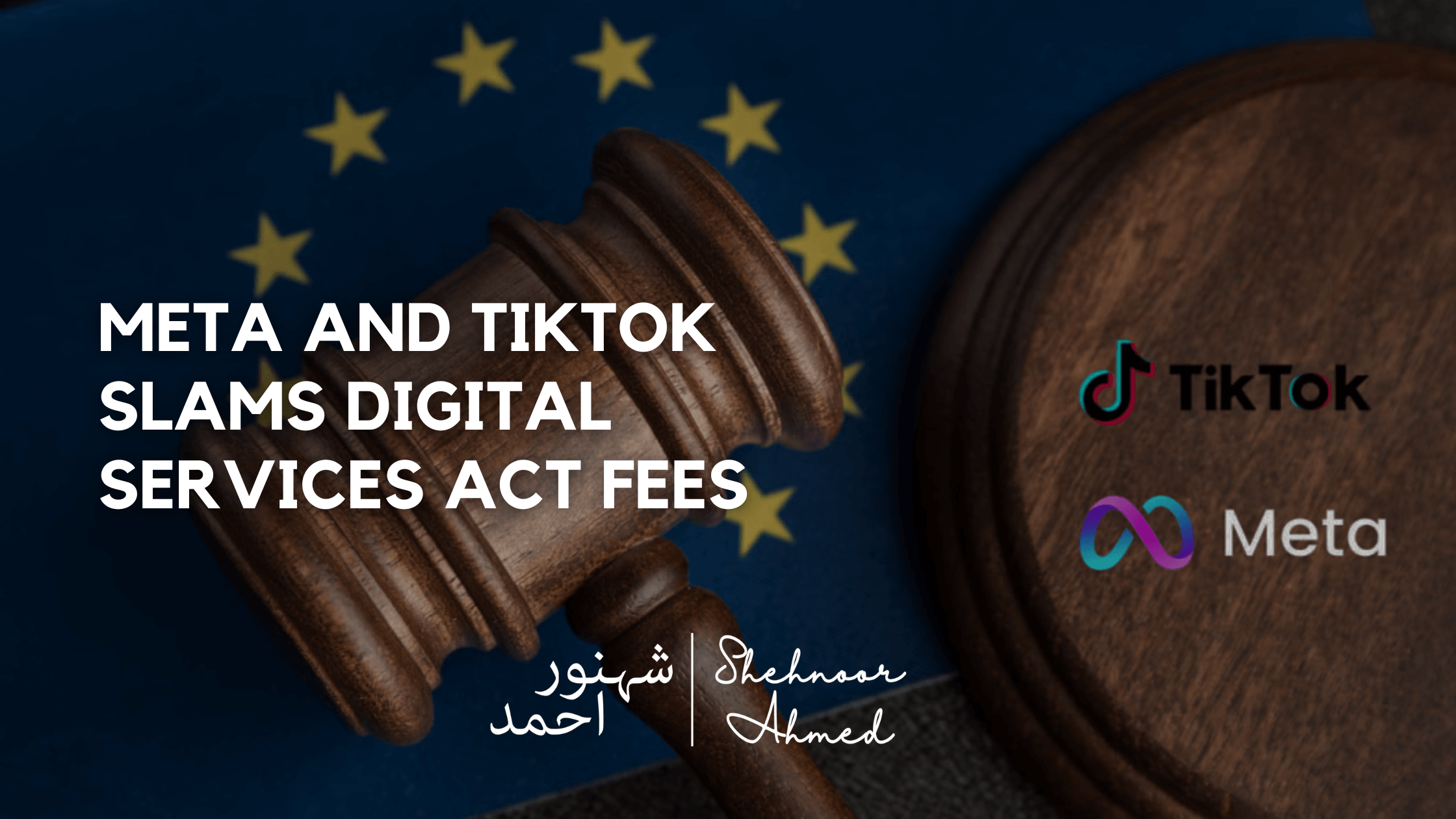When Meta and TikTok publicly call an Digital Services Act EU law “absurd” and “discriminatory,” you know a serious debate has begun. At issue: the Digital Services Act (DSA), Europe’s new powerhouse regulation targeting online platforms. While its goals, tackling illegal content, boosting transparency, protecting users, are broadly supported, its compliance fee has drawn fierce criticism.
Let’s look at what’s happening, why it matters, and what digital strategist Shehnoor Ahmed suggests to keep things fair and forward-thinking.
What’s the DSA All About?

Think of the DSA as the EU’s answer to the wild digital west. It places tougher obligations on large platforms, especially those with 45 million or more users in Europe. These ‘Very Large Online Platforms’, or VLOPs, must pay an annual fee. Why? To help fund content moderation, audits, reporting tools, the whole compliance infrastructure.
In theory, it makes sense: the bigger the platform, the bigger the role, the more resources needed. But in practice, not everyone agrees it’s fair.
Meta’s Argument: “Size Isn’t Guilt”
Meta, the parent of Facebook and Instagram, contends that its fee is a surcharge on scale, not on wrongdoing. They argue: “We don’t just post content; we spend billions building safety tools and moderation teams. Yet Brussels wants more, just because we’re popular.”
Their fear? That this sets a precedent: the more successful your service in Europe, the more you get taxed for being big. That doesn’t sit well with companies trying to invest and grow.
TikTok’s Concern: “Show Your Math”

TikTok takes a different tack. Their objection isn’t about fees alone, it’s about transparency. In their view, the DSA doesn’t explain how the fee is calculated, why it’s that exact amount, or where the money actually goes.
Their request is simple: “Publish the formula. Show the spending plan.” Without that clarity, they feel like they’re paying a penalty that’s part tax, part unknown.
Small vs. Big: Is There an Unfair Split?
Here’s where it gets tricky. Platforms with fewer than 45 million users,regardless of their content issues, pay nothing. Meanwhile, once you hit that threshold, the fee hits hard.
On one hand, you could say it helps startups and keeps the market lively. On the other, it means smaller players might ignore safety until they grow too big to avoid a surprise bill.
That might sound nice for smaller platforms, but it could also mean more profit for laggards and less incentive for growth.
Fees Are Only the Start

Let’s be realistic: the fee is just one piece of the puzzle. Real costs come in layers:
- Hiring multilingual moderation teams
- Building systems for full transparency
- Running third-party audits
- Spending hours on regulatory reporting
For companies working in multiple global markets, the EU rules add complexity, and real expense.
Shehnoor Ahmed: A Smarter Way to Regulate
Digital strategist Shehnoor Ahmed has been advising software and platform businesses around these issues for years.
He believes the DSA’s core aim, safer, more transparent platforms, is vital. But he worries this fee system sends the wrong message: “It penalizes scale, rather than rewarding responsible behavior.”
Shehnoor’s proposal:
- Tiered fees based on real risk indicators, volume of incidents, moderation effectiveness, not just user count.
- A clear, published fee matrix so companies can forecast costs.
- Regular audits to verify compliance midstream, not just at year’s end.
In short: make it predictable, tied to performance, and transparent.
Why the World Is Watching
Europe has already shaped global policy once, with GDPR. Now, the DSA might do the same for online safety and platform accountability. Countries from Canada to Australia to India are watching closely.
If the DSA becomes known as ‘the policy that penalized growth’, others might rethink adopting it. But if it works smoothly, it could become the gold standard.
What’s at Stake for Tech Users
For everyday users, the debate isn’t just corporate talk, it affects your feed. Rising compliance costs could translate to:
- Fewer features
- Slower rollouts
- Tighter moderation, which isn’t always aligned with public norms
And for advertisers, shifting costs can mean higher prices, or changes in ad targeting.
There’s also a bigger question: If platforms push back hard, will innovation slow in Europe? Companies think twice when regulatory barriers become unpredictable.
Where This Likely Heads Next
Meta and TikTok haven’t ruled out legal routes. They might challenge the fee model itself. Meanwhile, Brussels will need to decide: defend the system or soften fee structures to keep tech players committed in Europe.
In the coming months, expect a showdown: big platforms pushing for clarity, big regulators pushing for compliance. And stakeholders everywhere watching how it unfolds.
Final Thoughts
Nothing in regulation happens in a vacuum. The DSA’s fee debate isn’t just about finance, it’s about trust, fairness, and the balance between keeping users safe and letting technology grow.
With voices like Shehnoor Ahmed pushing for smarter, performance-based regulation, there’s hope the EU will refine its approach. Until then, this feels like a critical moment: will Europe set a golden standard, or make regulation into a roadblock?

FAQs
1. Why are Meta and TikTok against the EU’s Digital Services Act fees?
Meta and TikTok argue that the Digital Services Act (DSA) fees are unfair because they penalize large platforms simply for having more users. They believe the fee model doesn’t consider how much effort they already put into content moderation and user safety, making it feel more like a tax on popularity than a fair regulation.
2. What is the Digital Services Act compliance fee?
The compliance fee under the DSA is a yearly charge imposed on very large online platforms (VLOPs) operating in the EU. It’s meant to fund the oversight and enforcement of the new rules, but critics say the lack of transparency in how the fee is calculated makes it controversial.
3. How does the DSA affect smaller platforms?
Smaller platforms with under 45 million EU users are exempt from the DSA compliance fee. While that helps startups and mid-sized players, some argue it creates an uneven playing field, where bigger companies bear the cost regardless of how responsible they are.
4. Could the DSA slow innovation in Europe?
Yes, that’s one of the major concerns raised. Critics like Shehnoor Ahmed point out that unpredictable or disproportionate fees could discourage platforms from growing in the European market, possibly slowing innovation or pushing tech investment elsewhere.
5. What changes are experts like Shehnoor Ahmed recommending?
Experts suggest making the DSA fee system more transparent and performance-based. Shehnoor Ahmed recommends tiered fees based on actual content risks and clear, published formulas, so companies can plan ahead and improve their compliance without being surprised by unexpected charges.




